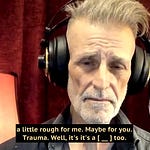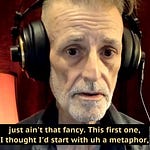Cold Open
You wanna pathologize me? Knock yerself out. Faithfully counting every leaf marked "deficit"…
But missing the whole damn forest we know locally as "Survival."
[Doc? You Got Us All Wrong, Pt 1: Autistic Resilience]
Intro
You're listening to AutisticAF Out Loud. One voice. Raw. Real. Fiercely Neurodivergent. Since 1953.
Season 5, Episode 5. “Doc? You Got Us All Wrong, Pt 1: Autistic Resilience.”
Deficits… or strengths? Survival… or thriving? Pathology… or inborn, natural autistic behavior? We turn the diagnostic telescope around. Let’s focus on the forest of resilience behind every leaf labeled "deficit."
An experimental multi-part series… all around 10 minutes. Because some neurodivergent listeners like to binge in small bites. Or you can download Part 1 and Part 2 at once… for listeners who crave the whole enchilada in one sitting.
Just one autistic elder's truth. I'm Johnny Profane.
Content Note: trauma discussion, medical system critique, institutional discrimination, psychiatric hospitalizations, systemic oppression + experiences & opinions of one autistic voice... in my 70s.
[Music]
What I tell any therapist… any caregiver… first session:
I have survived physical and sexual abuse from family and schoolmates.
Bullying by teachers and fellow students… 2nd grade through high school.
Multiple professional crashes… in multiple careers.
At least a dozen firings.
2 evictions.1 bankruptcy.
Dozens of major household moves.
Few friends, and…
2 divorces, 3 "living togethers," and a couple of "serious" relationships that, well…, weren't?
Ain't this resilience?
Resilience. Ya know, that cap-and-gown term pros use for getting knocked down seven times. Stubbornly getting up… eight...
I'm still alive. Still creating. Still getting published. Still speaking to thousands of autistics a year.
Never attempted suicide... despite three hospitalizations.
AND I'm still autistic. Cuz there ain't no cure for something that ain't wrong. Unless you base your "medical model" on some statistical "normal"… which is just a made up story. Cuz not one living person is summed up by a Bell curve normal… not even within a standard deviation.
Yes, yes… yes. Some professionals are evolving. Pros who listen more than lecture. But face it. In the grand scheme of things… they’re rare.
Let's get clear right now, right here. It's not being autistic that creates our trauma. It's living autistic in a society that inflicts trauma on us. Refusing to accept, adapt… support… us.
Why do "helping" pros focus on my deficits, my lacks, my pitiful performance of “Activities of Daily Living”…? Like, did I shower today…? No.
Rather than the sheer strength of will I demonstrate every time I take my next breath?
Why do they offer to fix me,
inform me,
guide me, and
charge me for sessions,
mentoring,
workshops,
best-selling books,
SYSTEMS they've just invented…
based on… at best… incomplete research?
[Music]
You know social media… if you like and share this podcast, a lot more people will check it out. You can do a lot of good with just one click.
You wanna pathologize me? Knock yerself out.
Turn my every inborn neurodivergent characteristic into a disease. You do have powerful diagnostic tools…
But you're looking through that diagnostic telescope backwards. Faithfully counting every leaf marked "deficit"… But missing the whole damn forest that we know locally as "Survival."
Like my "failure to maintain eye contact.” A “social deficit.” Right... completely missing how that survival skill lets me process your words… without painful sensory overload. My form of my respect… for you.
Go ahead and use professionally, objectively disempowering terms, like "comorbidity"... betraying your bias that my very way of Being is… in your eyes… a disease. And then riff on, elaborate away:
"pathological demand avoidance,"
"obsessive-compulsive disorder,"
"borderline personality disorder,"
And on and on… and on.
Truth? Every diagnosis? Just another survival mechanism. Not symptoms of autism. Responses to how society treats autism.
Behaviors that kept me alive… in your world. While you obsess over what's "wrong" with me…
Or… we could build on my autistic strengths.
Look, none of us have all of these. And superpowers don’t exist. Some have strengths not listed. But if you aren’t looking for them? Likely, you’re mis-treating us.
Resilience: Just surviving multiple, severe stressors is a biggie. Every autistic adult you meet has adapted to extreme challenges. Most of us… traumatized. Yet we endure. We integrate. We keep going.
Deep Feeling: Pros call ‘em "mood swings." We call it feeling everything… deeply. Depth that drives our creativity… in science, art, writing, becoming lunatic billionaires… or the cool neighbor next door.. It's not a flaw. It's fuel.
Survival Skills: My life, my continued existence… is my proof. Just as any autistic adult's life is. We've survived devastating life events. With inner strength and coping strategies.
These aren't skills most professionals understand… not even some neurodivergent practitioners. Because these skills are linked to how our individual autistic minds work. Which is… in fact… different. Not just from most humans. From each other, too.
Creative Persistence: Every autistic person knows this pull. Our passionate focus on our interests. Grabbing us deeper than hunger. We don't just see details… no matter what TV tells you. We work on wide canvases. We create. We build. We solve. That's strength.
Living with Extremes: My knee surgeon was shocked. "You walked two miles a day on a torn meniscus?" Yes, but… a light touch on my face can trigger panic. That's not contradiction. That's how we survive. We may get sensory warnings earlier than most… Yet we handle what breaks others. Daily.
Hidden Adaptability: Look at my life changes—jobs, homes, relationships. Society labels us as "rigid." Truth is, we adapt constantly. We got no choice. Yet we persevere. We keep doing. That's not weakness. That's strength.
Processing Power: We take in everything. Process it deeply. Yet live through emotional and sensory experiences that would derail most people. We keep going. Keep growing. That's not dysfunction. That's determination. Coming directly from… not despite… our neurodivergent cognition.
Spectrum of Strength: Maybe resilience is a spectrum, too. And some of us autistics crank it up past 11. Not weakness from disability. Strength from difference. Turning autistic stereotypes upside down. Yet again.
[Music]
Just a quickie… this is Part 1 of “Doc? You Got Autism All Wrong?” Why not binge the next part? Or download the long-form version with both parts? Link in transcript.
Challenging Normal-izing Models
My story? Just one among thousands. Millions.
I've worked as a magazine publisher. Functioned as an academic grad student… multiple times. And been homeless… multiple times. I've been privileged to hear many, many similar stories over the decades. At all levels of society, education, age.
These stories all share one truth: Autistic traits are not inherently deficits. They can be hidden sources of strength and resilience. In the right environment. In the right community.
Take one example: Pathological Demand Avoidance (PDA). What pros like to label our natural, neurodivergent response to external demands like deadlines.
I meet the diagnostic criteria. Always have. But in my opinion, they bulldoze right over my inborn need for autonomy. Leading too often to trauma. PDA… seems to me… a dehumanizing slur. For the nature I was born with.
Yet many neurodivergents find comfort and support diagnosed as PDA. In the acknowledgment of our differences the diagnosis does offer. I don’t wish to negate their experience. And I’m not arguing neurodivergents do NOT have needs for autonomy. Or that we don't suffer due to these differences. At the hands of Straight Culture.
My point: Sensory and social differences are NOT pathologies.
It's like dogs noticing that cats are more hyper than canines...
So to "help" ‘em, pro dogs decide to forcibly train or torture every cat. To steamroll them into converting to “Dog Normal.”
We are human… autistic humans.
We need what all humans need:
To build on our strengths.
To find our nurturing environments.
To choose our supportive communities.
We just accomplish these things... differently.
Look, I'm fighting the whole Normative Narrative. Which demands any difference MUST be "cured." Or at least fixed.
And I’m not keen on neurodivergent-based attempts to bandaid the problem. By simply defining a new normal for autistics and other neurodivergents. Just another standard we may fail to live up to.
Frankly, I'm calling for a strengths-based, non-normative psychology for all neurodivergents. A theme I develop in this series and future podcasts. How we might replace CBT and similar treatments with more neurodivergent-centered alternatives.
So where do we start this revolution?
Doc, Stop. Look again…
At the big picture this time. See those brilliant sparks of unusual strength? Far more powerful than your "deficits."
Reality check: Up to now, you've just been documenting how modern consumer culture fails our neurology. In the office. In our schools. In shopping at freaking Walmart for fuck's sake.
Anywhere we’re forced to process too much sensory input. Or pretend to read invisible social cues. Pretend we’re you… without rest or accommodation.
Let’s explore a new direction. Simply put?
Doc… stop looking through your telescope backwards. Look at us. Right in front of your eyes.
_____
References & Further Reading
Neither exhaustive nor comprehensive. Articles that made me think.
The high prevalence of trauma and adverse experiences among autistic individuals
How to build resiliency in autistic individuals: an implication to advance mental health
Association Between Autism and PTSD Among Adult Psychiatric Outpatients
The relationship between autism and resilience
The criticism of deficit-based models of autism
The reality of autistic strengths and capabilities
Note: Links are provided for reference only. Views expressed may differ from my own experiences and observations. Sources affiliated with Autism Speaks are controversial in the neurodiversity community. Their research may be included for completeness. But perhaps be cautious.
Doc, You Got Us All Wrong, Pt 2: CBT...? Never Worked for Autistic Me
Cold Open
CBT…? Never worked for autistic me.
So, look, we KNOW masking doesn't work. Or FEAR. Or PAIN. We’re dying from them already.
That's all the words we need.
[Music]
Intro
You're listening to AutisticAF Out Loud. One voice. Raw. Real. Fiercely Neurodivergent. Since 1953.
Season 5, Episode 6. “Doc? You Got Us All Wrong, Pt 2: CBT…? Never Worked for Autistic Me.”
Abelist agendas. Bad research subjects. Bad data. Bad therapy.
There’s the whole story.
An experimental multi-part series… around 10 minutes each. Cuz some autistic listeners tell me they like to binge in small bites. Others say they listen in the car… so you can also download the complete series as one file.
Just one autistic elder's truth. I'm Johnny Profane.
Content Note: trauma discussion, medical system critique, institutional discrimination, psychiatric hospitalizations, systemic oppression + experiences & opinions of one autistic voice... in my 70s.
[Music]
I've been struggling with an article on CBT & Autism for years.
Sigh. Spoons. A lot of reading. A lot of thinking…
To come to my opinion… my thesis…that any therapy based on purely cognitive techniques… even if pros throw on some Behavioral rubber-band-snapping special sauce on the side…?
It’s inherently ableist… attacking the very way our autistic brains are wired. Demanding abilities many neurodivergents just weren’t born with.
Here’s a snapshot. A quick personal story from when autistic-as-fuck me turned for help…
“I’m sorry… What did you just say?”
“I said…” He looked nervous. “I said… I always recommend aversive therapy for my autistic kids. My clients.”
Me. In a dead-cold voice. “Snapping a rubber band.”
“Y-e-s-s.” He seemed torn. Was I gonna get positive reinforcement… Or that weird, hostile, defensiveness professionals get. When you ask questions.
Into that hesitant silence, I say, “Snap it hard. Hard as they can. Against their wrist.”
“Yes. The sting is important.” Now, he’s eager to share. “When they repeat the aversive stimulus, they…”
Again I interrupt with my ashen, Clint-Eastwood voice. “During a meltdown.”
“Well… actually… just before.” He’s beaming, proud. “They learn to snap the band at the earliest hint they’ll lose control. It’s operant conditioning.”
A kid having a meltdown on Aisle 3. Likely overwhelmed by sensory overload.
Let’s just add a little sharp pain… and see what happens…
As if by giving it some science-y name… it’s not self-inflicted torture.
Brief CBT Background
Cognitive Behavioral Therapy emerged in the 60s. A kind of forced marriage. Between Beck’s cognitive therapy… focused on internal thoughts. And Skinner’s behavioral therapy… focused on observable behavior. Both developed studying neurotypical minds.
Change your thoughts, change your feelings, change your behavior… change your life. Simple, right?
Unless your brain doesn't work that way…
Sometimes…? Research… Ain’t.
How could COGNITIVE Behavioral Therapy not be inappropriate for autistics?
Research Problem #1. It's based on studying neurotypical populations. But we autistics think differently by definition.
Problem #2? For the foundational studies, CBT researchers used white, university student subjects… for the most part. They're easy and cheap to find. But maybe 3% are autistic? Maybe? ALL with decent IQs and functioning student skills… even the few autistic subjects?
And Problem #3 is a doozy. Many autistics survive by people-pleasing. Kids and grownups. We're likely to mask our true experiences to appear "better"... or please therapists. Plus we may have trouble perceiving and communicating our own experience. Self-reported data might not reflect our reality.,
Then there's one that’s rarely discussed. Problem #4… the "waitlist relief effect." Most neurodivergent folks endure months or years waiting for therapy, suffering intensely. When we finally get accepted into therapy? There's overwhelming relief… elevating our mood and behavior. Which distorts everything a therapist will hear.
We may dial up our masking. Cuz we’re scared shitless we’ll lose this lifeline.
Meanwhile, researchers publish, buff their nails…. and attribute any self-reported improvement as proof their technique works.,
The Cognitive Part…? A Stopper.
Substitute "executive functioning" for "cognitive." As in the thing they say is largely missing from my autistic forebrain.
The entire technique? One cognitive process after another..
First you must notice.
Then you must reflect.
Then decide.
Then review.
Then judge context.
Then review…
Finally…
Act.
Then regret.
Let that sink in. All of cognitive therapy is about monitoring individual thoughts for "cognitive errors." Then replacing them with correct ones.
Hundreds of decisions, distinctions, social cue processings. Executive functioning. A process that NEVER became automatic for me. As clinician after clinician cheerfully reassured me it would.
Many autistic individuals have memory differences. Working memory differences that make it nearly impossible to hold the kind of information cognitive work requires. Much less manipulate it on the fly…
Now… About Behavior.
Now, the "Behavioral" part of CBT? The Skinnerian special sauce?
Rewards… and punishments… for the action you choose. Hoping you’ll build automatic, correct responses.
Basically rat training. If you shock me enough times. Sure. I won't go through that door. AND I will struggle mightily to only have an internal stroke... rather than an external meltdown.
But the researcher... or teacher... gets to check the box, "Cured." Cuz we're no longer a nuisance to them. And we continue to quietly die. Invisibly. Politely...
Inside.
That kind of aversion... to fear or pain? True for every living thing at an evolutionary level above a paramecium.
Like rats. Or kids. Cuz... FEAR works. PAIN works. Just not the way they think.
These Practical Implementation Failures…
Should sound pretty familiar. To autistic folks. Keenly aware of the nightmare effort Autistic Masking demands around Straight Society.
So, look, we know masking doesn't work. Or fear. Or PAIN. We’re dying from them already.
That's all the words we need.
Add to this our difficulty forming new habits, maintaining routines, and processing cognitive information differently. Under stress… which therapy itself can induce… we often revert to previous behaviors. Any “improvements” from “techniques”? Not bloody likely they’re ingrained as permanent muscle memory.
Requiring frequent refresher sessions to maintain the illusion of change… and progress.
As one commenter wrote: "To me, CBT has always felt inherently surface-level. It's like closing a few tabs on your browser as opposed to doing a factory reset."
Biggest problem of all? Neurodivergent Diversity.
Autistic, ADHD, AuDHD, dyslexic, dyspraxic… all different cognitive profiles.
Sure, we're all different from the typical population. But an autistic who also experiences ADHD thinks and acts differently than a dyslexic one. At least to my trained observation. I was a mental health social worker for 10 years…
Despite these complexities… Maybe because it is complex… It seems to me that CBT treats us all as if we're standard-model humans. With a few bugs to fix.
We require GENERATIONAL studies of representative populations to sort this spaghetti pile out. Before we should be recommending these techniques.
On living humans. Adults. And especially kids.
ABA and Its Relatives: An Even Deeper Hole.
Applied Behavioral Analysis (ABA) deserves special mention. It's the behavioral therapy most parents hear about in grammar schools.
What most don't know? ABA shares roots with debunked, torturous gay Conversion Therapy. Outlawed in many states. Both were developed by O. Ivar Lovaas in the 60s.
Both aim to eliminate "undesirable" behaviors. Using “aversive” techniques. From snapping rubber bands in the nice clinics. To cattle prods in the not-so-nice facilities.
Punishing and suppressing behaviors that are natural to our nervous systems. Behaviors that protect us from a society not built for us.
ABA may have volumes of "data." But it’s all shaped by behaviors researchers and parents want, not what autistic children or adults need. The outcomes measured? Eye contact. Sitting still. Verbal responses. Not internal autistic wellbeing.
It’s important to understand one simple point. Data is not science.
How you frame your research or experiment
How you gather your data
How you choose how many subjects and whom
When you choose to gather data
How you interpret your data
How you present your data
All impact its validity and value. ABA and all its camouflaged cousins fall down on this core scientific truth.
Bottom line? When former ABA children grow up, many report trauma. PTSD. Anxiety. Depression. Self-harm.
Conclusion
Fuck #ABA. Fuck #CBT.
Everybody in the therapeutic-industrial complex from clinic receptionist to billionaire pharmaceutical CEO makes money. From your kid’s pain. Caused by treatments that don't address neurodivergent needs. As far as I… and better-known neurodiversity-affirming authorities… can tell.
Strong words? Yes. Because minds… and lives… are at stake.
We need therapies that work WITH our neurology, not against it. That build on our strengths instead of calling us coolly, professionally, pathologizing names.
In Part 3, we’ll really bring this all home. How labeling our intrinsic differences as disease is about as anti-therapeutic as you can get.
We'll explore "PDA… Not Every Difference Is a Disease." And really raise a ruckus.
Outro
For your deeper diving pleasure, the transcript contains references and footnotes for most points I raise. From a variety of views.
Hey, don’t forget, you can download Part 1, “Autistic Resilience.” Or download both parts as one file.
More coming in this series exploring how neurodivergent folks can build sustainable, authentic lives… with or without professional intervention. With 2 more parts coming…
AutisticAF Out Loud podcast is supported solely by listeners like you. If you have a friend or family member touched by neurodiversity? Why not turn them on to us with a quick email?
By the way, we believe no one should have to pay to be autistic. Many neurodivergent people can't afford subscription content.
Your Ko-Fi tip of any amount helps keep this resource free for them. Or join our paid subscriber community at johnnyprofaneknapp.substack.com for ongoing support. I put both links in description.
References & Further Reading
1: Ableist: Discriminating against people with disabilities by assuming everyone's mind and body work the same way. Like designing a world only for the "standard model human" and then blaming us when we can't navigate it.
2: Operant conditioning: A learning process in which behavior is shaped by rewards or punishments.
3: Beck, A. T. (1979). Cognitive therapy and the emotional disorders. Penguin.
4: Bottema-Beutel, K., & Crowley, S. (2021). Pervasive Undisclosed Conflicts of Interest in Applied Behavior Analysis Autism Literature. Frontiers in Psychology, 12.
5: Cage, E., Di Monaco, J., & Newell, V. (2018). Experiences of Autism Acceptance and Mental Health in Autistic Adults. Journal of Autism and Developmental Disorders, 48(2), 473-484.
6: Masking: The act of concealing one's autistic traits to fit in or avoid negative attention.
7: Meta-analyses show that waitlist control groups often overestimate the effect sizes of psychotherapies for depression and anxiety, and that changes occurring during waitlist periods are typically small, making waitlist-controlled trials a less strict test of effectiveness.
Cuijpers, P., Karyotaki, E., Reijnders, M., Purgato, M., de Wit, L., Ebert, D. D., ... & Furukawa, T. A. (2024). Overestimation of the effect sizes of psychotherapies for depression in waitlist-controlled trials: a meta-analytic comparison with usual care controlled trials. Epidemiology and Psychiatric Sciences, 33, e10.
8: Patterson, B., Boyle, M. H., Kivlenieks, M., & Van Ameringen, M. (2016). The use of waitlists as control conditions in anxiety disorders research. Journal of Anxiety Disorders, 41, 56-64.
9: Boucher, J., Mayes, A., & Bigham, S. (2012). Memory in autistic spectrum disorder. Psychological Bulletin, 138(3), 458-496.
10: Happé, F., & Frith, U. (2006). The weak coherence account: detail-focused cognitive style in autism spectrum disorders. Journal of Autism and Developmental Disorders, 36(1), 5-25.
11: Rekers, G. A., & Lovaas, O. I. (1974). Behavioral treatment of deviant sex-role behaviors in a male child. Journal of Applied Behavior Analysis, 7(2), 173–190.
See also: El Dewar (2024), "ABA: The Neuro-Normative Conversion Therapy," NDConnection; and the Lovaas Institute's 2024 statement regarding conversion therapy.
12: Sandoval-Norton, A. H., & Shkedy, G. (2019). How much compliance is too much compliance: Is long-term ABA therapy abuse? Cogent Psychology, 6(1).
13: McGill, O., & Robinson, A. (2020). "Recalling hidden harms": Autistic experiences of childhood Applied Behavioral Analysis (ABA). Advances in Autism, ahead-of-print.
14: Xie, Y., Zhang, Y., Li, Y., et al. (2021). Cognitive Behavioral Therapy for Autism Spectrum Disorders: A Systematic Review. Pediatrics, 147(5), e2020049880.810
15: Weston, L., Hodgekins, J., & Langdon, P. E. (2016). Effectiveness of cognitive behavioural therapy with people who have autistic spectrum disorders: A systematic review and meta-analysis. Clinical Psychology Review, 49, 41-54.
16: Miguel, C., Harrer, M., Cuijpers, P., et al. (2025). Self-reports vs clinician ratings of efficacies of psychotherapies for depression: a meta-analysis. Epidemiology and Psychiatric Sciences, 34, e9.
Note: Links are provided for reference only. Views expressed may differ from my own experiences and observations. Sources affiliated with Autism Speaks are controversial in the neurodiversity community. Their research may be included for completeness. But perhaps be cautious.













